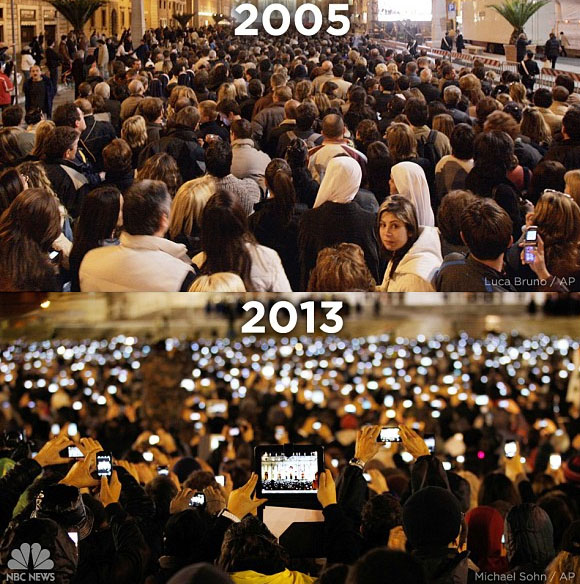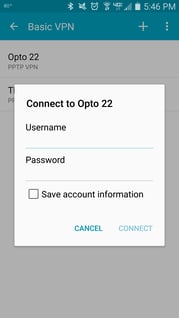Mobile device use - Russian Roulette or the new normal?
Many of us have a either a smartphone or tablet, and some of us have both. We use them for all sorts of tasks every day. Are we simply pushing our luck? Are we rolling the dice every time we use them? Or can we use them in a secure manner that helps us be more productive and thus have a higher quality of life?
This week's blog is going to look at some pros and cons of the humble mobile device and what steps we can take to even out the odds.
Advantages of Mobile:
The first advantage I think of is the sheer number of devices that are in use today. We are looking at millions and millions of millions. That's a LOT of people using a LOT of devices. This photo is from the inauguration of 2 different Popes; one in 2005, the other in 2013.

Mobile device acceptance has been global, and due to the numbers being manufactured, prices have really come down. Even if it's a phone that is just on Wifi so its running costs are almost zero, everyone from kids to grandparents can have a mobile device of some kind if they want to.
Because there are so many mobiles used by so many people, they have been accepted into many aspects of our lives.
Productivity has gone up. The classic example of this for me is the airport departure lounge. I sometimes have to fly for work, and when I do, I might be texting my wife and answering work emails. Without my mobile, that departure lounge would be dead air time. (Okay, yeah, I could read a book...)
Disadvantages of Mobile:
The scariest disadvantage of mobile is losing the device. If I lose it, it's like losing the front door to my life and my job.
Another concern is network access and security. I use a heap of apps. Some only work when I'm in my house, and some work when I am away. I need a way to be sure only I can access my home network and that I have a way to connect to my home network when I am away. It's the same with my job. I need to get access to those network drives and files while I am out of the office.
Finally, there are just too many apps. I have a phone full of apps. I have apps for photos, an app for the lights, an app for music, an app for the thermostat, an app for my health, an app each for my many network and RF tools, an app for my scales, an app for my sleep tracker, apps for my shopping (one for each shop), an app for my car (one for the motor computer and one for the tire pressures), an app to track my flight, an app for my smartwatch (one each for my Android Wear and Pebble Time), and a bazillion apps for my many interests and hobbies.
It's a security minefield.
Making mobile more secure.So, what can we do about all this?
The good thing about having so many devices in circulation is that many people and companies have addressed all of these issues and it's often a matter of choosing what level of security we want to use.
The number one thing we should do—right this second—is auto-lock and passcode-protect your mobile!
Here is a great writeup from 2011; I suspect that even though it's from a few years back, not much has changed: 44% of people back then thought it was too much of a hassle to lock their phone. To me, this is just nuts. Putting your phone down even for a few moments is like leaving the front door of your life wide open, even if it's just a prank post to one of your social sites by friends, family, or co-worker.
Bottom line: yeah, it's going to be a drag. Every single time you go to use your phone you have to put in a PIN, swipe a pattern, or use a fingerprint sensor. But it's the first line of defense to having a more secure life. Better to do it now and NOT regret not doing it if you lose your phone! (For what it's worth, I use a PIN on my phone.)
On network security and access, we covered it a few weeks back: use a strong passphrase on every WiFi network setup that you connect to.
For more network security and access to network files and folders, use a VPN (Virtual Private Network). You may already have one to access your company network while on the road or from home. If you don't, ask your IT guys. If you are your IT guy, look into buying a router that supports VPN, or get a VPN server.
All the modern mobile devices have VPN client software on them, and it's trivial to set up. (That's what I do to connect to my home network when I'm not home.)
Here's the key: DO NOT store the VPN username and password on the mobile. It adds another layer of security for you. Yes, it's a bit of a hassle having to enter it every time you want to connect to the network, but it's more secure.

Here is a screen shot from my phone. You can see the login screen for Opto's VPN, and my home is the one below that. Neither of the tunnels have the username or password stored on the device. iOS has similar VPN client software built in. There is really no reason (or excuse) not to use this extra layer of authentication and encryption.
Too many (insecure) apps? Replace as many of them as you can with groov.
Be honest. Your mobile is your life(line):
With so much convenience and ubiquity, mobile devices are here to stay. The data is now leaking onto our wrists via wearables like smartwatches (a blog for another day). We need to pause, think about just how much of our work and private lives are on our mobile, and then take steps to secure it.
Use a strong passphrase, PIN, or complex swipe pattern to lock the device. Secure the networks you connect to. Secure the apps you use.
Using a mobile is not like Russian roulette if it's secure. It is normal, and it is safe. You get to choose the balance between security and ease of use.Till next week. Cheers Mate.
